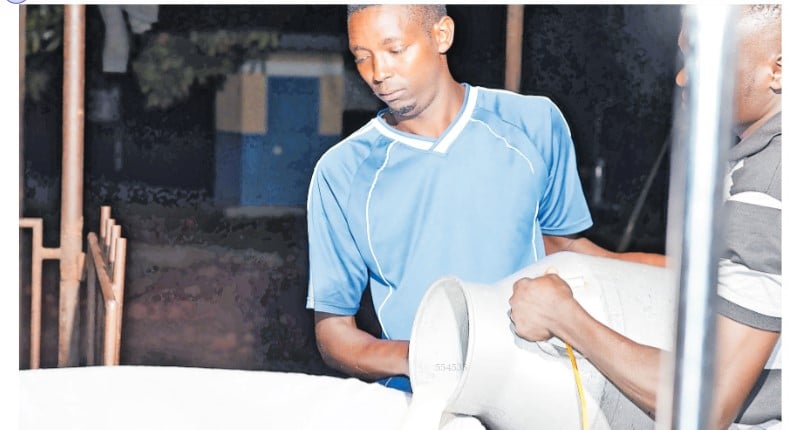Prime
Build your house without straining

A quantity surveyor will help you plan for whatever money you have set aside for constructing your house. They will also make sure that the contractor operates within the budget.
What you need to know:
- Building a house is no mean feat but if you think about certain things and ensure that your presence is felt at the site, among other things, you might not feel the strain of constructing a house.
Many will attest to the fact that building a house is not only draining but also a costly venture unless you have lots of cash.
Nonetheless, experts reveal that once you have acquired land, there are many ways of simplifying construction without draining both your brain and pockets.
Identify your source of materials
According to Mathias Omona, a civil/structural engineer with Homeplan Architecture, while drawing your budget, have a rough idea of where you will get materials such as water, bricks, sand, and concrete and if possible go there in person and negotiate with the providers.
Also while transporting materials to the site, depending on the location, look for affordable means. “It is cheaper if you used your own vehicle or hired a truck compared to using the source’s known means which are quite costly”.
Buy and store
There are materials that you can buy and easily save. For instance, cement, tiles, toilets, sinks, wheel barrows, and other items can be bought in installments until you have enough to cover the floor. Richard Mutegyeki, the finance and investment manager, National Housing says you do not have to acquire large sums of money to acquire everything.
“Buy what you can afford and store away until the right time to use it. But if you can afford to buy large quantities, go to mainstream shops or the industries for items such as iron sheets,” he advises.
Mutegyeki also notes that it is also important that you spot a specific hardware for other materials so that when you do not have money, a single call will send material to your site, even in your absence, but cautions that while doing this, exhibit a high level of credit worthiness.
Monitor material
Lydia Namuli, a business woman and real estate developer, says builders have a tendency of wasting material, especially when they are not supervised.
“You will be shocked to find a chunk of cement wasted in the earth, bricks broken, mixtures wasted, paint dried up in containers and you will not do anything about it. So ensure materials are used in their right quantities and stored well,” she says.
Note that you do not have to be an expert in construction, but your engineer should be able to let you know of basics such as quantities used and on what levels.
In addition, store away materials carefully and even when this will be frowned upon by those you are supervising, tick off the used materials and note what is required.
Use cheap labour
Endeavor to find affordable labour. There is a belief that costly labour does quality work but there are great or highly skilled builders or contractors that will provide cheap labour. Namuli confesses that for her rentals, she sourced labour from her village and admits they did a great job. Her site porters were relatives who were paid fairly and her young brother did the supervision.
It is hard to find cheap labour around town but if you asked colleagues or friends, they will gladly recommend some,” she notes, adding that only those recommended as good and professional should be considered.
More tips
According to Richard Mutegyeki, the finance and investment manager, National Housing, your presence at the site (even once in a while) will not only ensure that the contractors do a good job, but also handle materials well and also eases accountability of resources.
Namuli shares that she made sure she surfaced at the site during construction amid her busy schedule because according to her, chances are high that in your absence, you will buy more material or items than required.
“Some workers even have a tendency of hiding cement or other materials or selling them off and claiming they are finished,” she reveals.
Build in phases
You do not have to erect the house at once. Mathias Omona, a civil/structural engineer with Homeplan Architecture, states that if funds do not allow, build the house and complete a few vital rooms by fixing doors, windows and plastering.
“Other things can be completed while you are in the house. There is no point in paying large sums of money for rent when you can enter one side of your house as you finish construction. That money (meant for rent) can be used to top up more items”.
“My family and I entered our house without plastering. Other windows and doors plus toilets, sinks, tiles and the ceiling in some rooms were fixed while we slept peacefully (rent-free).”
Samalie Khainza, an advocate retorts, advising that If you are bent on fully completing your house before you shift, you will be stressed because a house can never be exactly the way you dreamt it to be in just a few months.
Unfortunately, she cannot recall the total amount of money used while constructing in bits, but says “you will spend without stress and are not visibly drained”.
All in all, as luxurious as it may seem, building a house without a hustle, especially when your financial position is not solid is possible as long as you plan well, be there or hire a trust worthy supervisor and also, do not rush it.
A quantity surveyor will help you plan for whatever money you have set aside for constructing your house. They will also make sure that the contractor operates within the budget.




